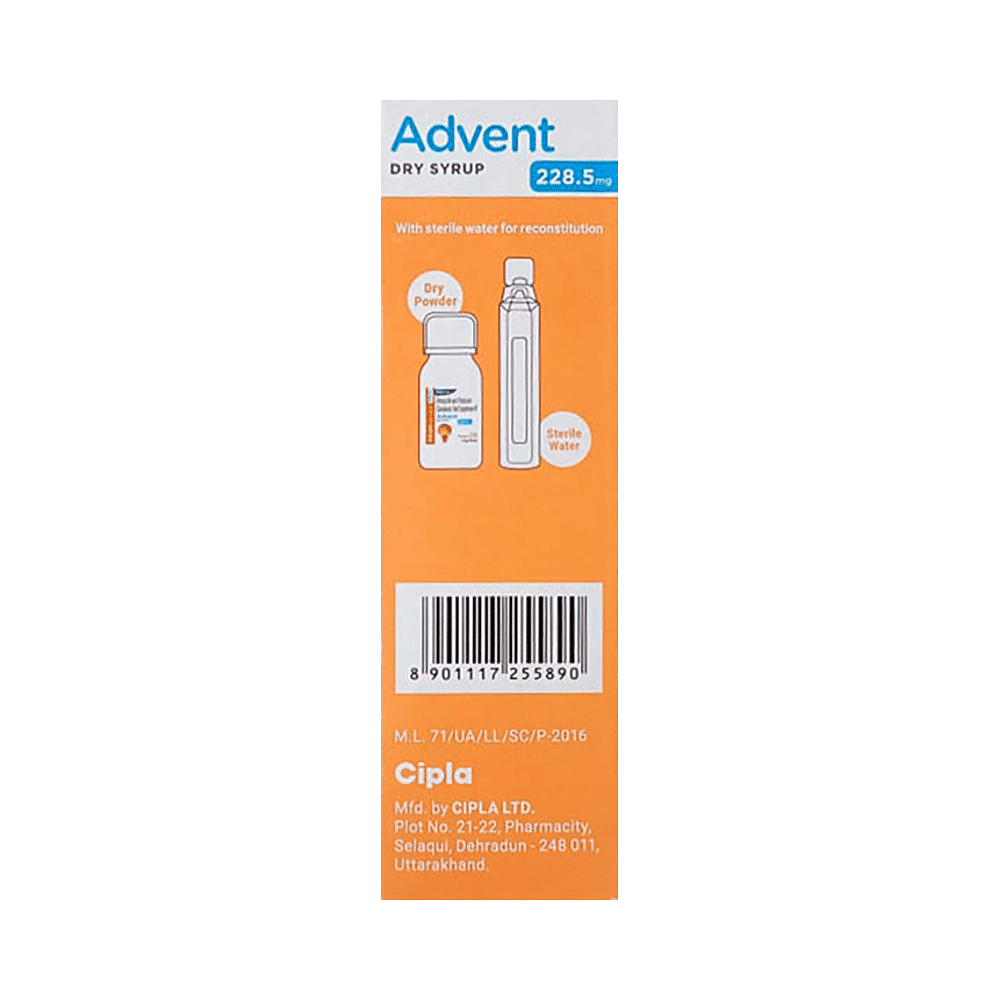
Clovin Dry Syrup
Manufacturer
Apple Biomedics Ltd
Salt Composition
Amoxycillin (200mg/5ml) + Clavulanic Acid (28.5mg/5ml)
Key Information
Short Description
Clovin Dry Syrup is an antibiotic medicine that helps treat bacterial infections of the ear, nose, throat, chest, lungs, teeth, skin, and urinary tract.
Dosage Form
Dry Syrup
Introduction
Clovin Dry Syrup is an antibiotic medicine that helps treat bacterial infections of the ear, nose, throat, chest, lungs, teeth, skin, and urinary tract. It is capable of killing bacteria that have become resistant to other therapies and thus also helps treat tuberculosis that is resistant to other treatments.
Directions for Use
Your child must complete the entire course of antibiotics. Stopping too soon may cause the bacteria to multiply again or cause another infection.
Safety Information
Side Effects
Bitter taste in the mouth after intake Diarrhea Itchy rash, facial swelling, or breathing difficulty (stop use and report to doctor immediately)
How it works
Clovin Dry Syrup is an antibiotic. It has two active agents amoxycillin and clavulanic acid. Amoxycillin works by preventing the formation of the bacterial protective covering (cell wall) essential for the survival of the bacteria. Whereas clavulanic acid serves a special purpose of inhibiting an enzyme (beta-lactamase) that is produced by resistant bacteria.
Quick Tips
Your child must complete the entire course of antibiotics Encourage your child to drink plenty of water in case diarrhea develops as a side effect Never give Clovin Dry Syrup until and unless prescribed by the doctor Do not give Clovin Dry Syrup to treat common cold and flu-like symptoms caused by viruses Check 'expiry' before giving Clovin Dry Syrup to your child and immediately discard all the expired medicines
Related Medicines

Advent 228.5mg Dry Syrup Tangy Orange

Clavonac Dry Syrup

Formentin Dry Syrup

Figoclav Dry Syrup

Moxbio CV Dry Syrup

Clavspark Dry Syrup

Oximox XL Dry Syrup

Instaclav Dry Syrup

Moxitec CV Dry Syrup

Zoxilin CV Dry Syrup
Frequently asked questions
Can other medicines be given at the same time as Clovin Dry Syrup?
Clovin Dry Syrup may interact with other medications or substances. It's important to inform your child's doctor about all medications they are taking before starting treatment with Clovin Dry Syrup. Always check with your child's doctor before giving any medication to your child.
Can I get my child vaccinated while on treatment with Clovin Dry Syrup?
Antibiotics usually do not interfere with the ingredients in vaccines or cause a negative reaction in a child who has recently received one. However, children should avoid receiving vaccinations until they are fully recovered from any illness. Once your child feels better, they can receive the vaccine.
Which lab tests may my child undergo while taking Clovin Dry Syrup on a long-term basis?
The doctor may periodically monitor kidney and liver function in children who are undergoing long-term therapy with Clovin Dry Syrup. This helps ensure the safety of the treatment.
Can I give a higher than the recommended dose of Clovin Dry Syrup to my child?
Giving a higher dosage of this medication may increase the risk of side effects. If your child experiences worsened symptoms, consult their doctor for re-evaluation.
Can I stop giving Clovin Dry Syrup to my child when the symptoms are relieved?
No, do not stop giving this medicine to your child unless the full course of treatment is completed, even if you feel better. Symptoms may improve before the infection is fully cured. Therefore, it's crucial to continue with the medication for the entire course.
Can the use of Clovin Dry Syrup cause diarrhea?
Yes, Clovin Dry Syrup can cause diarrhea as it kills harmful bacteria in the body and alters the balance of helpful bacteria in a child's gut. Encourage your child to drink plenty of fluids if they experience diarrhea. If it persists or you notice signs of dehydration (like dark-colored and strong-smelling urine), consult your doctor before administering any other medication.
Do all viral common colds result in secondary bacterial infection?
Viruses typically do not lead to secondary bacterial infections. Antibiotics should only be used after consulting with a doctor in case of a suspected bacterial infection and only when medically necessary.
The mucus coming out of my child’s nose is yellow-green. Is it a sign of a bacterial infection?
Yellow or green nasal discharge does not necessarily indicate a bacterial infection. This is common during the common cold. Symptoms usually last for 7 to 10 days.
Is there any sign which shows that my child needs immediate medical attention?
Call your child's doctor immediately if they experience serious allergic reactions (breathing problems, skin rashes), gastrointestinal infections (diarrhea), or liver damage (weakness, paleness, vomiting). While rare, these severe side effects need prompt medical attention.


